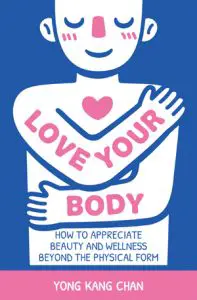Disclosure: There might be affiliate links on this page. As an Amazon Associate, I earn from qualifying purchases. This means I will earn a commission if you decide to make a purchase through my links but it will be at no additional cost to you.
Do you love your body only when it’s perfect and functioning?
You probably know it’s important to accept your body for what it is and to take care of it.
But does this sound like you? Whenever you look at the mirror, the first thing you do is nitpick or look at your imperfections.
You continue to work despite being sick. Or you find it a hassle to maintain a healthy diet.
Loving the body is usually secondary to our egoic needs.
Other areas such as career, finance, relationships, quality of life are usually more important than our health. We delay our meals and sacrifice our sleep when we are busy. We plan and schedule as many work and leisure activities as we can in our waking hours. Even when we diet and improve our physical appearance, we do it to impress and attract others so they will like us. We don’t do it purely for the sake of the body.
There are many books on body positivity and acceptance. They challenge unrealistic standards that society has on beauty and help you overcome body shame. They are also other books on how to love your body, which focus more on self-love and improving your relationship with the body.
In this blog post, we’ll be covering these two points. In addition, we will discuss how can we continue to appreciate the body even when we are sick or diagnosed with a chronic illness.
How to Love Your Body Despite Imperfections and Illnesses
1. Love your body from the spiritual perspective.
Recently, I published my seventh book, Love Your Body. In this book, I share how we can appreciate our bodies from the spiritual perspective.
The way our spirit perceives the body is different from how our ego perceives it.
The spirit sees the body as sacred and an ally. It is grateful for the physical manifestation the body brings. The ego, on the other hand, uses the body as a tool to get what it wants, which is to build a better image and identity. The ego loves the body when it’s beautiful and well. But when there’s an imperfection or we fall sick, the body is of no use to the ego. This is when all the nitpicking, self-hatred, despair, etc come in.
To know what perspective you are following, ask yourself what your real intention is. Are you doing it out of gratitude and appreciation for the body or are you trying to get something out of it? For example, if you want to change your physical appearance, are you eating food to nourish your body, or are you eating to reach your ideal weight?
Of course, I’m not saying you can’t set a weight loss goal. But when someone is connected to their spirit, they will often check in with how they feel emotionally and physically. They will stop exercising if they feel they need a break. On contrary, someone who is controlled by an unhealthy ego will push themselves to lose weight even when they are struggling. The former cares about how the body is doing, while the latter is focused on reaching the goal and has no regard for their physical well-being.
2. Learn to look at the big picture and what’s working.
Two people with the same bodyweight. One feels happy and positive, while the other feels frustrated and depressed. Two people with the same chronic illness. One lives peacefully, while the other lives in despair and fear. How come people with the same circumstance can feel so differently about it?
The way you see your life shapes your life.
People who give attention to what’s lacking or what’s not working feel more unhappy in their lives. Whenever they look in the mirror, they focus on their flaws. Even though they have other beautiful facial features, all they can see is their imperfections. That’s because they have spent a lot of time practicing looking at what’s wrong and it became a habit.
The thing is no one will go up to you and examine all the flaws on your face. Most people don’t at you in such great detail. Only, you do. Instead of focusing on the small details and imperfections, zoom out and look at yourself from a big picture perspective. Furthermore, it’s not always the physical form that makes someone beautiful. More often than not, the energy a person exudes determines whether someone is attractive or not. People who are confident in how they look tend to attract others to them.
You want to develop the habit of looking at what you have and making the best out of it. Even when you are sick, you can also find things that are still working and pay attention to them. For example, you can appreciate your heart and lungs for keeping you alive.
3. Trust your body and support it when necessary.
When you become sick, especially when you have a chronic illness and you can’t do what you used to, sometimes you might feel so useless and hate your body for not functioning properly. During this time, it’s important to know that your body is doing the best it can to bring itself back to harmony. Instead of pushing yourself to heal, it’s best you trust your body and support it in its healing.
Many times, when we are frustrated and impatient, we make the situation worse. For example, I remember three years ago, I was down with a severe cough and fever. When I felt slightly better after I took the medicine, I tried to work. But instead of getting work done, I went into another slumber. I felt worse and it slowed down my own healing process.
You are sick for a reason.
Your body wants you to rest and look at life from a different perspective.
Nowadays, when I feel sick, I just rest and surrender. I trust my body knows what to do and how to heal itself. I don’t have to do much. I just have to provide it with enough fluids, sleep, good nutrients, and most importantly, great emotions! I realize the worse I feel, the longer it takes for my body to heal. Emotions affect our physical well-being. When you are worried, depressed, and angry, your body not only has to heal your disease but also has to process your emotions. You are giving the body more work to do and this slows down its healing process.
The spirit and the body are co-creators. They support and cooperate with one another. When you are viewing your illness from the spiritual perspective, you know when to step back and let your body take charge. There is trust. You don’t try to push the body faster than it could heal itself.
4. Find things to appreciate about your body.
There are many things you can appreciate about your body. For example, I’m grateful for my fingers right now. They allow me to type this blog post. You can be grateful for your eyes because they allow you to see the beautiful places in the world. Or you can be grateful for body parts that you can’t see with your naked eyes such as your stomach and intestines. You can appreciate how they help you to digest food and extract nutrients from food.
Finding things to appreciate about the body is easy,
but we have to make it a habit.
To love your body, you want to make appreciation a daily habit. You don’t want to wait until you are sick and then appreciate your body. That’s because when you are dealing with the physical symptoms of a disease, sometimes you are reactive and consumed by your emotions. You might not have the awareness to practice gratitude and will forget about it.
That’s why you want to practice gratitude during your good days too. The more you do it, the easier it gets when you face a crisis and you will remember to do it. It doesn’t have to be about the body too. If you run out of things to appreciate about your body, look at your environment or examine your life to see what you can be grateful for or use some gratitude prompts. It’s about developing the habit of appreciation. Once you build this habit, you find it easy to appreciate everything in your life.
5. Listen to your body.
Listening is one of the ways you can build a better relationship with your body. Imagine you are in a relationship with someone who doesn’t listen. They don’t care about what you have to say or they dismiss all your opinions. How does that make you feel?
Building a relationship with your body is not that different. You want your body to feel heard, valued, and respected. But how many times do we just ignore or neglect the message from our bodies? If your eyes are tired, your body is telling you to rest. When you are hungry, your body is telling you to eat something. When you dismiss these messages from the body, you are telling the body it’s unimportant or it doesn’t know what’s good for you.
Your body has great wisdom.
It can help you make decisions such as what to eat and when to eat.
Animals instinctively know what to do and what to eat. We, humans, are a bit lost. We have forgotten how to use our instincts because we have been ignoring them. Instead, we are constantly relying on other people to tell us what’s good and bad for us, or what beauty is. But other people don’t have as deep a connection with your body as you have. All of us are of different body shapes and types, what’s good for someone might not be good for you.
To get back to this natural wisdom your body has, you have to start paying attention to your body and notice all its subtle messages. Even if you are not following its signals, at least acknowledge that you have heard them. This is a way to show love and appreciation for your body.
If you want to learn more about loving your body, be sure to read my book, Love Your Body.
Featured Photo Credit: Johannes Plenio








